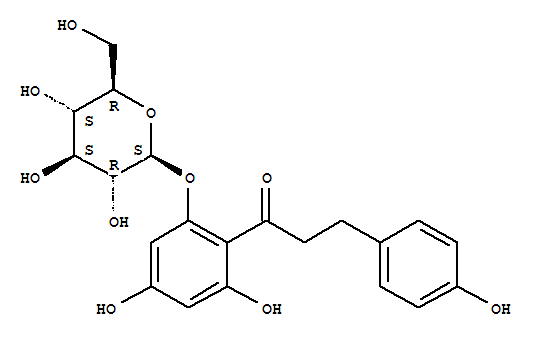| Identification |
| Name: | 1-Propanone, 1-[2-(b-D-glucopyranosyloxy)-4,6-dihydroxyphenyl]-3-(4-hydroxyphenyl)- |
| Synonyms: | Phlorizin(8CI);Floridzin;NSC 2833;Phloretin 2'-O-glucoside;Phloretin 2'-glucoside;Phlorhizin;Phloridzin;Phloridzosid;Phlorizine;Phlorizoside;Phlorrhizin;Phlorizin; |
| CAS: | 60-81-1 |
| EINECS: | 200-487-1 |
| Molecular Formula: | C21H24O10 |
| Molecular Weight: | 436.45 |
| InChI: | InChI=1/C21H24O10/c22-9-16-18(27)19(28)20(29)21(31-16)30-15-8-12(24)7-14(26)17(15)13(25)6-3-10-1-4-11(23)5-2-10/h1-2,4-5,7-8,16,18-24,26-29H,3,6,9H2/t16-,18-,19+,20-,21-/m1/s1 |
| Molecular Structure: |
 |
| Properties |
| Density: | 1.555 g/cm3 |
| Refractive index: | 1.686 |
| Appearance: | Light yellow powder |
| Specification: |
Phlorizin , its cas register number is 60-81-1. It also can be called 1-(2-(beta-D-Glucopyranosyloxy)-4,6-dihydroxyphenyl)-3-(4-hydroxyphenyl)-propan-1-on ; Phlorhizin ; Phloretin-2'-O-beta-glucoside ; and Phlorizoside .
|
| Storage Temperature: | 2-8°C |
| Usage: | It is a dihydrochalcone occurring in all parts of the apple tree except the mature fruit. Once thought to occur in pear, plum, cherry trees and other Rosaceae |
| Safety Data |
| Hazard Symbols |
 Xi: Irritant
Xi: Irritant
|
| |
 |